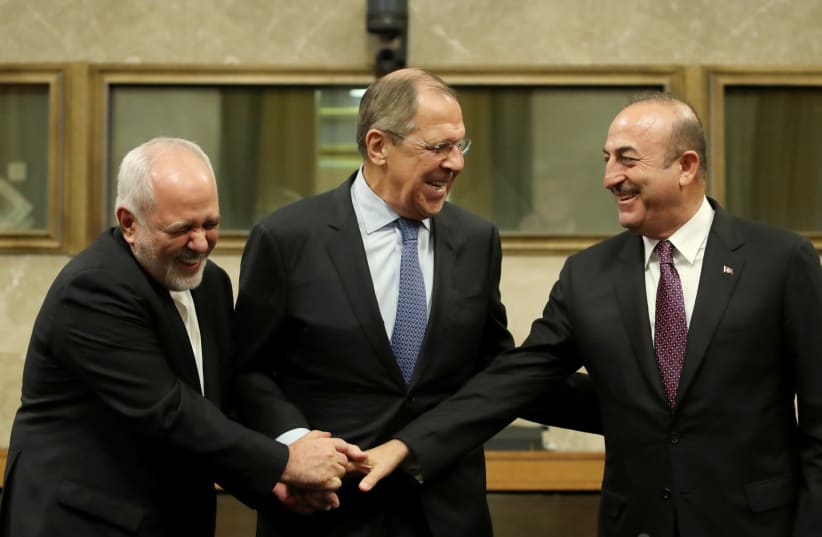The meeting in Geneva, attended by foreign ministers of the three countries, Russia’s Sergei Lavrov, Iran’s Javad Zarif and Turkey’s Mevlut Cavusoglu, cemented the growing commonalities between these three regimes’ views of Syria. Although Turkey has backed the Syrian opposition since the rebellion began in 2011 while Russia and Iran back Bashar al-Assad’s government, the three countries share several interests. They all oppose the US presence in eastern Syria.
Turkey intervened in northern Syria in 2016 in Operation Euphrates Shield, which was directed at stopping the Kurdish-backed People’s Protection Units (YPG) from expanding their role in Syria. It was also aimed at removing ISIS from the border. Turkey increased its role in Syria in 2017 with observation points in Idlib and then intervening in the Kurdish region of Afrin in northwest Syria, again with the aim of removing the YPG, who Ankara views as terrorists, from the border.Now Turkey wants to launch another operation against the YPG in northern Syria, with the Turkish President Recep Tayyip Erdogan vowing to prevent a “terror corridor” along Turkey’s border.The US, who has forces in eastern Syria and is working with the Syrian Democratic Forces, (of which the YPG are a part), has warned Turkey against intervening. Turkey has also encouraged Syrian rebel groups to support an operation against the YPG. This is part of efforts to pivot the rebels against the US-backed groups in the east, thus enabling Turkey to further discussions about the Assad regime.
Iranian media emphasized the success of the Geneva discussions because Iran wants to portray itself as increasing its influence, particularly in the face of heavy US sanctions. Press TV highlighted the meeting as the “first session of a UN-sponsored Syrian Constitutional Committee” that will begin early next year to search for a “viable peace process.” Compromise and constructive agreements would underpin the discussions.Lavrov said that it was a positive meeting, and noted that Moscow, Tehran, and Ankara are committed to Syria’s sovereignty, independence and territorial integrity.
But there are hurdles. Turkey, Iran and Russia have met before to discuss Syria, in Astana and Sochi. This is the new iteration of several years of these meetings that first brought de-escalation to parts of Syria and then enabled the regime to conquer southern Syria, expel the rebels from Damascus, and eventually to come north toward Idlib.In September, Turkey and Russia agreed to an Idlib ceasefire under which Turkey would take responsibility for observation posts and issues in Idlib. This is supposed to entail removing extremists from groups like Hayat Tahrir al-Sham, the Syrian version of Al-Qaeda, from Idlib. So far this has been a rocky road but peace has prevailed.Turkey’s goal here is to show it stands by the Syrian opposition and that Syrian refugees might return to northern Syria. In January, March and December, Ankara said that parts of Syria controlled by the Kurdish YPG should be returned to the ”true owners,” a not so thinly veiled demand that Syrian rebel groups, that are mostly Sunni Arabs, control Afrin, Manbij and other areas.Turkey has said that hundreds of thousands refugees are returning. Turkish media says millions could return, but for that to happen peace must prevail.
The constitutional committee is supposed to consist of 50 members of the regime’s government, and 50 opposition members. But it appears that the countries can’t agree on the list of names. Zarif has boasted that the meeting has still been a win for Iran and a loss for the West.“We have always insisted on a political solution led and owned by Syrians," Zarif said. "The West has now been compelled to accept this.”Syrian state media has been silent on the developments, sensing that despite boasting about Syrian “sovereignty,” the process doesn’t even involve Syrian officials. Syria is looking to increase its legitimacy in the region after hosting Sudan’s president this week as well as Iranian delegations. It hopes the Iraqi president will visit next.
For the US, the meeting in Geneva appears to be an embarrassment. In November, US Syria envoy James Jeffrey said that the US is concentrating on working towards a Syrian political process under UN Resolution 2254 and “convening under UN auspices a committee to begin work on the Syrian constitution.”He said that the US had agreed in October – along with Russia, France, Germany and Turkey – to “establish this constitution committee by the end of the year.” Now the committee might be formed, but the US appears to have no role.Speaking at the Atlantic Council, Jeffrey said that the Syrian Democratic Forces should “become part of the fabric of a changed Syrian society,” and that they would potentially play a role like other political parties in Syria. But none of the US-backed groups in eastern Syria appear to be on the list so far.Thus the US isn’t only sidelined, but groups it worked with who played the leading role in defeating ISIS, appear cut off from the post-civil war political process. How the US might get back to the table is unclear, but Iran seems to be the winner in these discussions, portraying itself as a responsible player. The symbolism of the Turkish Prime minister’s smiles in photos posted to Twitter, shaking hands with Lavrov and Cavusoglu, illustrates Iran’s prominence.
“We’ve gathered in Geneva in a meeting hosted by the UN. Reached an important phase in the endeavors for the formation of the Constitutional Committee in Syria,” Cavusoglu wrote. Zarif agrees.
